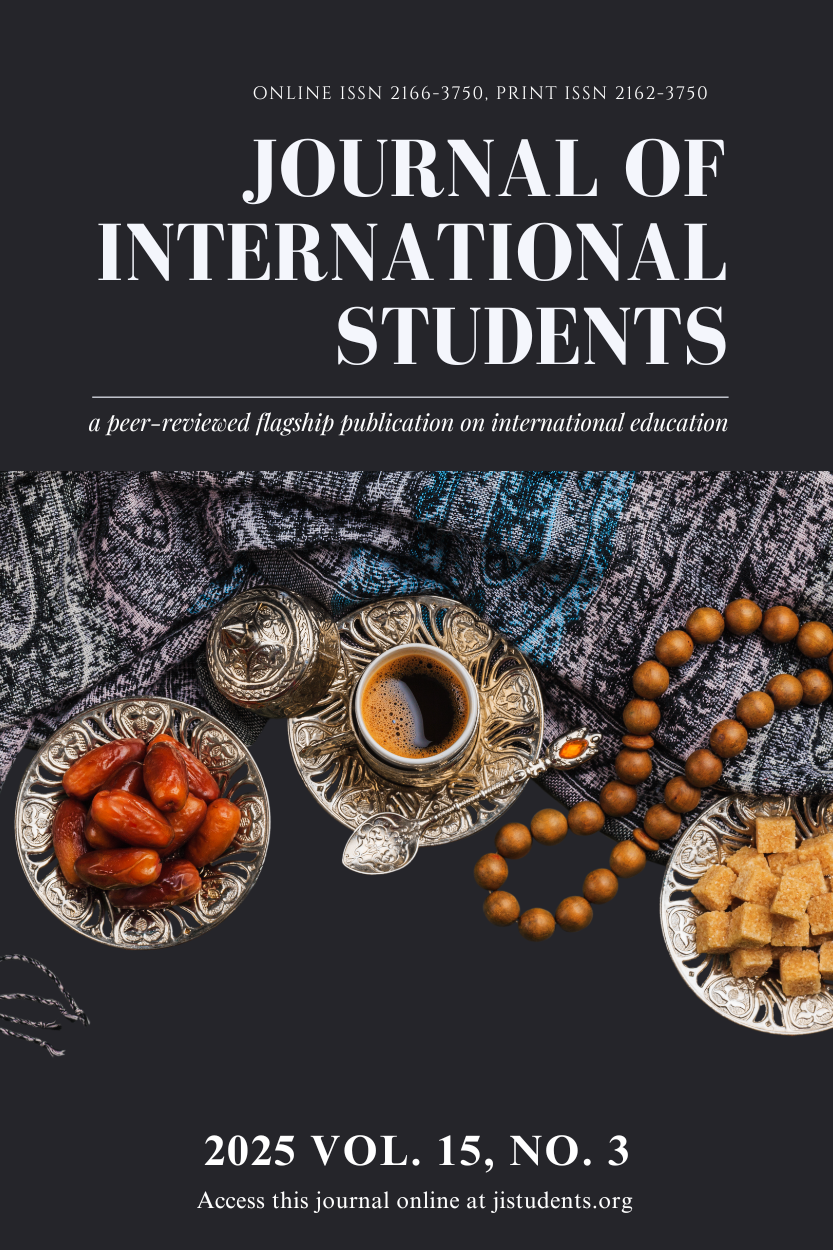Exploring the experience of Muslim students and scholars in Western academic institutions
DOI:
https://doi.org/10.32674/9157yx86Keywords:
muslim students, international students, global student mobility, international education, foreign students, study abroadAbstract
This special issue of the Journal of International Students explores the multifaceted experiences of Muslim students and scholars in Western academic institutions. It investigates challenges such as acculturative stress, social integration, language barriers, and the psychological well-being of Muslim international students. The volume provides insights into the unique experiences of Muslim students navigating cultural, religious, and academic identities in Western educational contexts. This compilation, contributing to the broader conversation on diversity, inclusion, and equity in higher education, features 28 authors from 9 countries, offering crucial perspectives on the academic and social lives of Muslim students and scholars in the West.
References
Abu Khalaf, N., Woolweaver, A. B., & Smith, R. (2023). The impact of Islamophobia on Muslim students: A systematic review of the literature. School Psychology Review. https://doi.org/10.1234/spr.2023.001 DOI: https://doi.org/10.1080/2372966X.2022.2075710
Al-Krenawi, A. (2016). The role of the mosque and its relevance to social work. International Journal of Social Work, 59(3), 359-367. DOI: https://doi.org/10.1177/0020872815626997
Al-Krenawi, A., & Al-Krenawi, L., (2022). Acculturative stress and reverse culture shock among international students: Implication for practice. The Arab Journal of Psychiatry, 33(1), 9-18.
Al-Krenawi, A., Alotabi, F., & Elbedour, S., (2021). Acculturative stress among female Saudi college students in the United States. Community Mental Health Journal, 57(2), 372-379 DOI: https://doi.org/10.1007/s10597-020-00659-8
Al-Krenawi, A., Alotaibi, F., & Elbedour, S., (2019). Acculturative stress among non-Western female students in the West: The Female Arab case. Academia Journal of Educational Research 7(10), 326-335.
Al-Krenawi, A., & Graham, J. R. (2005). Marital therapy for Arab Muslim Palestinian couples in the context of re-acculturation. The Family Journal, 13(3), 300-310. DOI: https://doi.org/10.1177/1066480704273640
Alkhalaf, K., Al-Krenawi, A., & Elbedour, S., (2024). Reverse culture shock among Saudi students returning from the US to their homeland. Journal of International Students, 14 (4), 741-759 DOI: https://doi.org/10.32674/jis.v14i4.6483
Barakat, M. (2018). Advocating for Muslim students: If not us, then who? Journal of Educational Administration and History, 50(3), 223-237. https://doi.org/10.1080/00220620.2018.1455382 DOI: https://doi.org/10.1080/00220620.2018.1439903
Bendeck Sotillos, S. (2022). Towards Islamic Psychology and Psychotherapy [Review of the book Developing a Model of Islamic Psychology and Psychotherapy: Islamic Theology and Contemporary Understandings of Psychology by Abdallah Rothman]. Spiritual Psychology and Counseling, 7(3), 409–416. https://dx.doi.org/10.37898/spc.2022.7.3.182 DOI: https://doi.org/10.37898/spc.2022.7.3.182
Berry, J. W. (1997). Immigration, acculturation, and adaptation. Applied Psychology: An International Review, 46, 5–34. https ://doi.org/10.1111/j.1464-0597.1997.tb080 87x. DOI: https://doi.org/10.1111/j.1464-0597.1997.tb01087.x
Berry, J. W. (2001). The psychology of immigration. Journal of Social Issues, 57, 615–631. https ://doi.org/10.1111/0022-4537.00231. DOI: https://doi.org/10.1111/0022-4537.00231
Callaway, A. (2010). Literature review: The growing need to understand Muslim students. Multicultural Perspectives, 12(2), 81-87. https://doi.org/10.1080/15210960.2010.481229 DOI: https://doi.org/10.1080/15210960.2010.527590
Denman, C. J. (2012). Cultural divides between Arab-Muslim students and Western literature: Implications for the English language classroom. In Literacy, Literature and Identity (pp. 33-45). Routledge.
Douglass, S. L., & Dunn, R. E. (2003). Interpreting Islam in American schools. The Annals of the American Academy of Political and Social Science, 588(1), 52-72. https://doi.org/10.1177/0002716203588001005 DOI: https://doi.org/10.1177/0002716203588001005
El-Sherif, L. (2016). Mirages in the desert: Theorizing Western Muslim identity across 60 years. Curriculum Inquiry, 46(3), 299-322. https://doi.org/10.1080/03626784.2016.1186345 DOI: https://doi.org/10.1080/03626784.2016.1140003
Khalifa, M., & Gooden, M. A. (2010). Between resistance and assimilation: A critical examination of American Muslim educational behaviors in public schools. Journal of Negro Education, 79(3), 53-65.
NAFSA: Association of International Educators (2016). NAFSA International Student Economic Value Tool. Retrieved from: http://www.nafsa.org/Policy_and_Advocacy/Policy_Resources/Policy_Trends_and_Data/NAFSA_International_Student_Economic_Value_Tool.
Norris, P., & Inglehart, R. F. (2012). Muslim integration into Western cultures: Between origins and destinations. Political Studies, 60(2), 228-251. https://doi.org/10.1111/j.1467-9248.2011.00928.x DOI: https://doi.org/10.1111/j.1467-9248.2012.00951.x
Sirin, S. R., & Fine, M. (2008). Muslim American youth: Understanding hyphenated identities through multiple methods. NYU Press.
Sodowsky, G. R., & Plake, B. S. (1992). A study of acculturation differences among international people and suggestions for sensitivity to within-group differences. Journal of Counseling & Development, 71(1), 53–59. https://doi.org/10.1002/j.1556-6676.1992.tb02171.x DOI: https://doi.org/10.1002/j.1556-6676.1992.tb02171.x
Stubbs, B. B., & Sallee, M. W. (2013). Muslim, too: Navigating multiple identities at an American university. Equity & Excellence in Education, 46(3), 387-405. https://doi.org/10.1080/10665684.2013.805984 DOI: https://doi.org/10.1080/10665684.2013.838129
Welch, A. (2012). Seek knowledge throughout the world? Mobility in Islamic higher education. Research in Comparative and International Education, 7(1), 17-33. https://doi.org/10.2304/rcie.2012.7.1.17 DOI: https://doi.org/10.2304/rcie.2012.7.1.70
Yeh, C. J., & Inose, M. (2003). International students reported English fluency, social support satisfaction, and social connectedness as predictors of acculturative stress. Counselling Psychology Quarterly, 16(1), 15–28. https://doi.org/10.1080/0951507031000114058 DOI: https://doi.org/10.1080/0951507031000114058
Downloads
Published
Issue
Section
License
Copyright (c) 2025 Journal of International Students

This work is licensed under a Creative Commons Attribution-NonCommercial-NoDerivatives 4.0 International License.
All published articles are licensed under a Creative Commons Attribution-NonCommercial-NoDerivs 4.0 Unported License.















